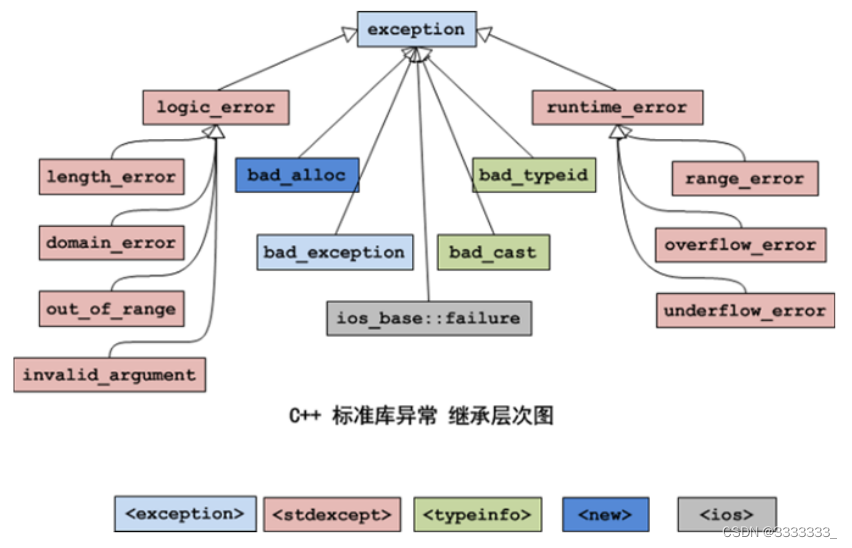异常的理念看是有前途,但实际的使用效果并不好,
编程社区达成了一致意见,最好不要使用这项功能。
C++98引入异常规范,C++11已弃用
一、异常的语法
1)捕获全部的异常
try
{
// 可能抛出异常的代码。
// throw 异常对象;
}
catch (...)
{
// 不管什么异常,都在这里统一处理。
}
2)捕获指定的异常
try
{
// 可能抛出异常的代码。
// throw 异常对象;
}
catch (exception1 e)
{
// 发生exception1异常时的处理代码。
}
catch (exception2 e)
{
// 发生exception2异常时的处理代码。
}
在try语句块中,如果没有发生异常,执行完try语句块中的代码后,将继续执行try语句块之后的代码;如果发生了异常,用throw抛出异常对象,异常对象的类型决定了应该匹配到哪个catch语句块,如果没有匹配到catch语句块,程序将调用abort()函数中止。
如果try语句块中用throw抛出异常对象,并且匹配到了catch语句块,执行完catch语句块中的代码后,将继续执行catch语句块之后的代码,不会回到try语句块中。
#include <iostream>
using namespace std;
//异常
void test()
{
try
{
int ii = 0;
cout << "请输入选择,1:cosnt char*抛出异常,2:int异常,3:stirng异常,4:正常" << endl;
cin >> ii;
if (ii == 1)
{
throw "该抛就抛";
}
else if (ii == 2)
{
throw ii;
}
else if (ii == 3)
{
throw string("string");
}
cout << "ok" << endl;
}
catch (int ei)
{
cout << "异常的类型是int=" << ei << endl;
}
catch (const char *ec)
{
cout << "异常的类型是const char *=" << ec << endl;
}
catch (string es)
{
cout << "异常的类型是string=" << es << endl;
}
// catch (...)
// {
// cout << "捕获到异常,没管具体什么异常" << endl;
// }
cout << "程序结束" << endl;
}
int main()
{
test();
return 0;
}
异常规范
C++98标准提出了异常规范,目的是为了让使用者知道函数可能会引发哪些异常。
void func1() throw(A, B, C); // 表示该函数可能会抛出A、B、C类型的异常。
void func2() throw(); // 表示该函数不会抛出异常。
void func3(); // 该函数不符合C++98的异常规范。
C++11标准弃用了异常规范,使用新增的关键字noexcept指出函数不会引发异常。
void func4() noexcept; // 该函数不会抛出异常。
在实际开发中,大部分程序员懒得在函数后面加noexcept,弃用异常已是共识,没必要多此一举。
关键字noexcept也可以用作运算符,判断表达试(操作数)是否可能引发异常;如果表达式可能引发异常,则返回false,否则返回true。
C++标准库异常

五、重点关注的异常
1)std::bad_alloc
如果内存不足,调用new会产生异常,导致程序中止;如果在new关键字后面加(std::nothrow)选项,则返回nullptr,不会产生异常。
2)std::bad_cast
dynamic_cast可以用于引用,但是,C++没有与空指针对应的引用值,如果转换请求不正确,会出现std::bad_cast异常。
3)std::bad_typeid
假设有表达式typeid(*ptr),当ptr是空指针时,如果ptr是多态的类型,将引发std::bad_typeid异常。
#include <stdexcept>
#include <iostream>
#include <string>
using namespace std;
int main()
{
string str = "123"; // 不会抛出异常。
// string str = ""; // 将抛出Invalid_argument异常。
// string str = "253647586946334221002101"; // 将抛出out_of_range异常。
try
{
int x = stoi(str); // 把string字符串转换为整数。
cout << "x=" << x << endl;
}
catch (invalid_argument &)
{
cout << " invalid_argument. \n";
}
catch (out_of_range &)
{
cout << " out of range. \n";
}
catch (...)
{
cout << " something else…" << endl;
}
}





















 1080
1080

 被折叠的 条评论
为什么被折叠?
被折叠的 条评论
为什么被折叠?








